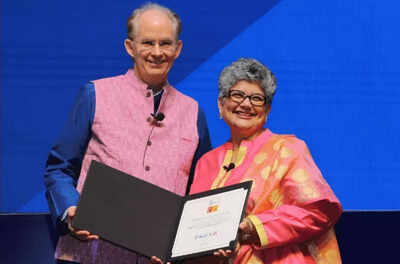ARTICLE AD BOX

Tim Gokey, CEO, Broadridge, and Sheenam Ohrie, country MD, Broadridge India
Tim Gokey, CEO of Broadridge, the $7-billion US company that offers technology and communications solutions to financial services businesses, says technology is enabling the democratisation of investment.
About 60% of North Americans, he says, hold shares today, compared to 40% some 15 years ago. And there’s a similar trend of money moving from banks to broader financial markets across the world, he says, adding this is a more efficient way to drive economic growth and to provide higher returns for investors.“Now, in North America, there’s a big thing called managed accounts. We’re moving to fractional shares and direct indexing, and just more and more innovation.
It is making the number of people able to invest higher and the cost of doing that lower,” he says.A managed account is an investment portfolio that is customised to the owner’s financial goals and risk tolerance, offering transparency and direct ownership of assets, unlike pooled investments like mutual funds. Previously, these were primarily for the ultra-wealthy, because offering such customisation was a manual, expensive and time-consuming process.
But now, tech platforms aggregate data and automate administrative processes.
Algorithms and software can automatically rebalance portfolios to maintain a person’s desired asset allocation.Gokey notes that digital brokerages have also substantially reduced cost. Internet-based trading platforms and advanced algorithms enabled seamless online account management and trading at lower costs. App-based platforms like Robinhood in the US, and Zerodha and Groww in India, have reduced trading fees to near zero, focusing instead on revenue models based on other financial products and services.
This has attracted a new generation of investors.These technology advances have also enabled easier access to fractional shares (software is allowing brokerages to offer fractional shares with greater precision than is typically available on public exchanges) and direct indexing (where you directly own the individual stocks that make up a market index, instead of buying a mutual fund).AI FOR RECOMMENDATIONSBroadridge has been an integral part of these advances, offering a range of services from shareholder communications, such as proxy statements and virtual meetings, to data and analytics, and back-office solutions that streamline trading operations.
It offers common technology and operational platforms for common business processes – what Gokey calls ₹mutualisation’ – so that financial firms can focus on their core activities.
Since its founding in 1962 as ADP Brokerage Services Group, it has helped the industry to move to electronic and digital processes, and then apps, helping simplify communication and improve disclosures, and thereby accelerate democratisation and innovation.More recently, it has developed AI products like BondGPT, which helps bond analysts slash hours of manual research by drawing on reliable data sets to answer highly specific queries, and OpsGPT, which streamlines backoffice reporting and reconciliation. Broadridge’s India engineers have played key roles in the development of these products. AI, Gokey says, will work best as a recommendation engine for now, given that you can’t make mistakes in financial matters.About 5,000 of Broadridge’s 15,000 employees are in India, mostly in Bengaluru and Hyderabad. The biggest part of the company’s associates, Gokey says, are working on technology and the India offices are doing a lot of this work.INDIA GCC CONNECT, ACQUISITION PLANIndia is becoming important also in two other ways. The India GCC is beginning to work directly with the India GCCs of some of Broadridge’s biggest global customers, the likes of Wells Fargo, Citibank, Nomura, Northern Trust, HSBC, and SocGen.
“As our clients have built their own operations (in India), we were finding that our team in India would be talking to our team in New York, our team in New York would be talking to our client’s team in New York who’d be talking to their team in India who was like a block away from our team in India,” Gokey says.
Instead, Sheenam Ohrie, country managing director for Broadridge India, has set up what she calls “a zero distance between the GCCs of our customers here.”
Teams here help client GCCs with training on Broadridge products, resolve problems, strategising and discussing what they need next.India is also becoming an important market opportunity for Broadridge. Gokey notes that demat accounts in India have tripled in just the last four years. Ohrie says they are keen to acquire a fintech platform or product company to leverage their customer base to start selling.

 5 hours ago
5
5 hours ago
5









 English (US) ·
English (US) ·